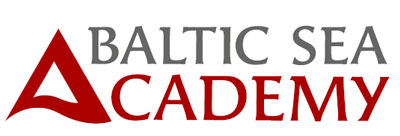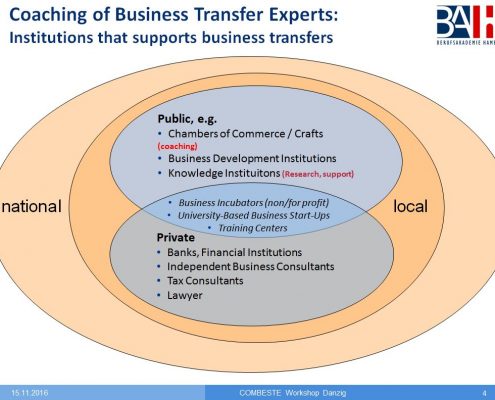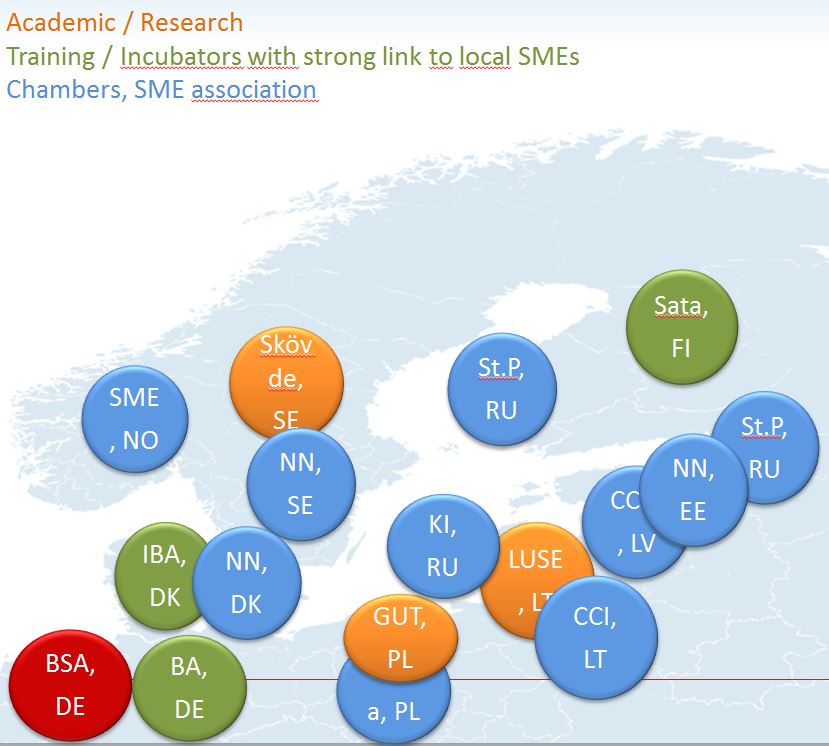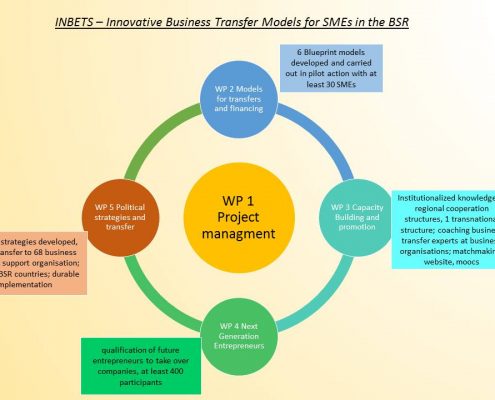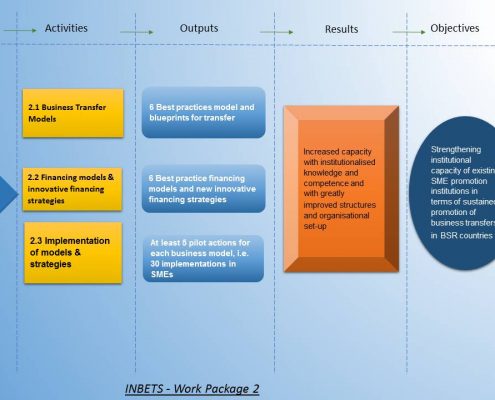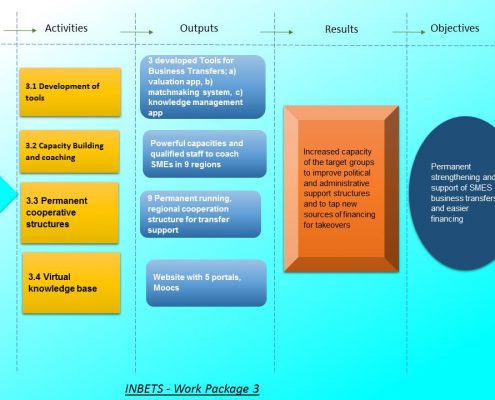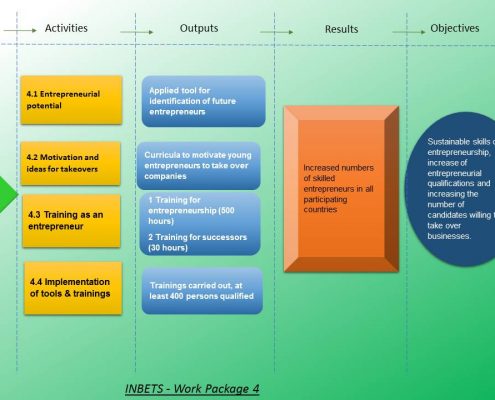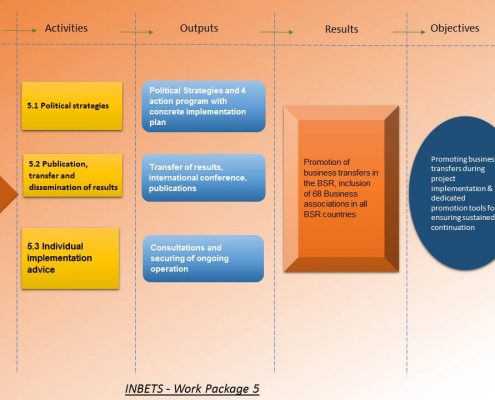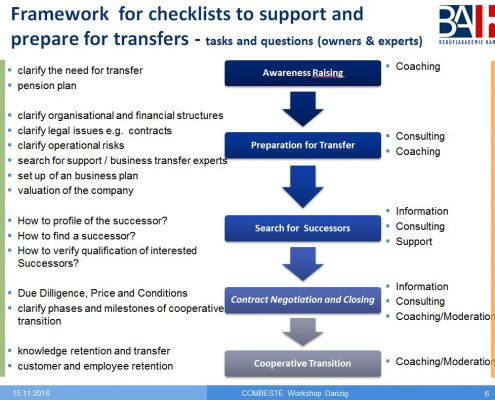The generation change reached SMEs: More jobs are lost as part of failed transfers than newly created with start-ups !
1) The backbone of innovative regions are innovative SMEs. While several initiatives exist to promote innovative start-ups and incubators only very few measures focus on the further support and continuation of existing companies. Many SMEs face a crucial moment when the business gets transferred, e.g. due to retirement of the previous owner. In fact, more jobs are lost due to failed business transfers, than new jobs are created in start-ups every year.
Over the next decade up to 500,000 businesses providing 2 million jobs will have to be transferred every year and at least 1/3 of business failures are the consequence of bad transfers. Against this backdrop it is essential to improve the conditions for business transfers.
This holds especially true for the eastern member states of the European Union. In Poland, Lithuania, Latvia and Estonia most companies have been started in the early 1990s. The owners must transfer their businesses in the next years and they as well as other actors such as business organisations have hardly any experience with business transfers.
SMEs are a very heterogeneous group. There is not one solution for all, but a toolset including most promising methods for all categories of SMEs will be developed and put to the test.
2) SMEs have difficulties when facing a business transfer due to the lack of:
(a) time and suitable successor
SMEs usually have a planning horizon of 3-6 months ahead, but a business transfer needs to be planned earlier, at least 12–36 months are needed for a successful shift. Lack of preparation of business transfers leads to difficulties in finding a suitable successor, securing necessary funds as well as reorganizing the company. It is the intention of this project to prevent this negative cycle from happening by proposing and implementing concrete measures on a grass root level.
(b) financing
Often, the leaving owner has non-realistic expectations regarding the value of his enterprise, with an expected buy-out price 150 – 200 % above real value. A true, market-oriented valuation by a third party is needed. Likewise, successors need support to finance the take-over.
(c) know-how
1. There is a lack of expertise in many business support organisations regarding innovative models for transfer and its planning, especially in eastern countries.
2. Employees or externals interested to take over the company lack knowledge how to actually run it. They might be experienced employees with a lot of expertise regarding the product or service of a company, but no entrepreneurs.
3. Lack of understanding regarding the transfer and retention of relevant organization knowledge needed to keep the company going.
Business support organisations (coaching), research institutions (knowledge) and education providers (training) team up to provide SMEs with excellent support for a succesful transfer of company and knowledge !
The Parntership covers all BSR countries and brings together Business support organisations (coaching the SMEs), Business established training institutions (training BDOs, Chambers, Train-the-trainer and companies) and universities (providing and adapting knowledge) :
-
Baltic Sea Academy, DE
-
Business Chamber Warsaw, PL
-
Vilnius Chamber of Commerce, Industry and Crafts, LT
-
Latvian Chamber of Commerce and Industry, LV
-
Estonian Chamber of Commerce and Industry, EE
-
St. Petersburg Foundation for SME Development, RU
-
Association of SMEs support centers of the Kaliningrad region, RU
-
DRIVHUSET, SE
-
International Business Academy, DK
-
Hamburg University of Corporate Education, DE
-
Gdansk University of Technology, PL
-
Lithuanian University of Science and Education, LT
-
Satakunta University of applied sciences, FI
-
University of Skövde, Business School, SE
The knowledge institutions (universities) will compile the best possible solutions and adapt them to the regional needs. The training institutions will provide the knowledge to the intermediaries (business organisations), that will then coach the SMEs on an ongoing basis.
The partnership will be supported and completed by several associated organisations:
- Hanse-Parlament (network of 50 Business Chambers from all BSR countries)
- Ministry of Economy, Estonia
- Ministry of Econmy, Latvia
- Ministry of Economy, Lithuania
- Russian Presidential Academy of National Economy and Public Administration, Russia
- Office of the Marshall of the Pomorskie Voivodeship, Poland
- Municipality of Skövde, Sweden
- Senate of the Free and Hanseatic City of Hamburg, Germany
- Mesterbrev, Norway
- Business Aabenraa, Denmark
- Vaeksthus Syddanmark, Denmark
- Arbejdsgiverne Industri + Handvaerk, Denmark
- Satakunnan Yrittäjät, Finnland
- Enterprise Lithuania
Some of the outputs planned to achieve the overall result :
- Development of 6 models for ideal business transfers, based on best practices
- Creation of 6 financing models for securing a smooth transfer between owner and successor
- All models will be realised in pilot actions with at least 30 SMEs. The pilot actions will be evaulated and models adapted if needed
- Development of three essential tools for succssful transfers ( 1. Valuation tool for SME, 2. Matchmaking System between owner and potential successor, 3. Knowledge Management app for SMEs)
- Creation of permanent support by setting up capacities at local business support organisations, in particular coaching of staff to become transfer experts and advise local SMEs
- The local business support organisation will establish cooperation structures with other stakeholders like credit institutions, administrations, training facilies in 9 BSR regions. They will be connected on a transnational level to allow mutual learning and exchange of solutions
- Train next generation entrepreneurs and successors with 5 different qualifications, pilot actions with at least 300 participants
- Development of political strategies and 4 action programs for the better ongoing support of business transfers.
Reserach: Over the next decade up to 500,000 businesses providing 2 million jobs will have to be transferred every year ; at least 1/3 of business failures are the consequence of bad transfers
If you are interested to learn more about the importance of successful business transfers, these information are helpful:
- More jobs are lost due to failed business transfers, than new jobs are created in start-ups every year (CECOP study, p.20 available at http://www.cecop.coop/IMG/pdf/bussiness_transfers_to_employees_under_the_form_of_a_cooperative_in_europe_cecop-4.pdf ).
- Over the next decade up to 500,000 businesses providing 2 million jobs will have to be transferred every year and at least 1/3 of business failures are the consequence of bad transfers (EC SBA Review 2011, available at http://ec.europa.eu/growth/smes/business-friendly-environment/small-business-act ).
- Guidebooks on support to SME policy from structural funds, Nr. 3 Facilitating transfer of business , https://ec.europa.eu/growth/smes/business-friendly-environment/regional-policies_en
- Business take-overs can be a good entry mode for young entrepreneurs, instead starting their own business, http://www.dge.ubi.pt/msilva/Papers_MECE/Paper_11.pdf
- In Germany, between 2014 – 2018 about 135.000 Business Transfers will take place, affecting about 2 Mio. Jobs, https://www.econstor.eu/bitstream/10419/88607/1/77469534X.pdf
- The importance of instutionalising knowledge and keeping it in the company when the new generation takes over, Managing organizational memory with intergenerational knowledge transfer,
- DG Growth section on business transfers https://ec.europa.eu/growth/smes/promoting-entrepreneurship/advice-opportunities/transfer-business_en
- Entrepreneurship competence framework 2016, to develop entrpreneurial skills of successors https://ec.europa.eu/jrc/en/publication/eur-scientific-and-technical-research-reports/entrecomp-entrepreneurship-competence-framework
